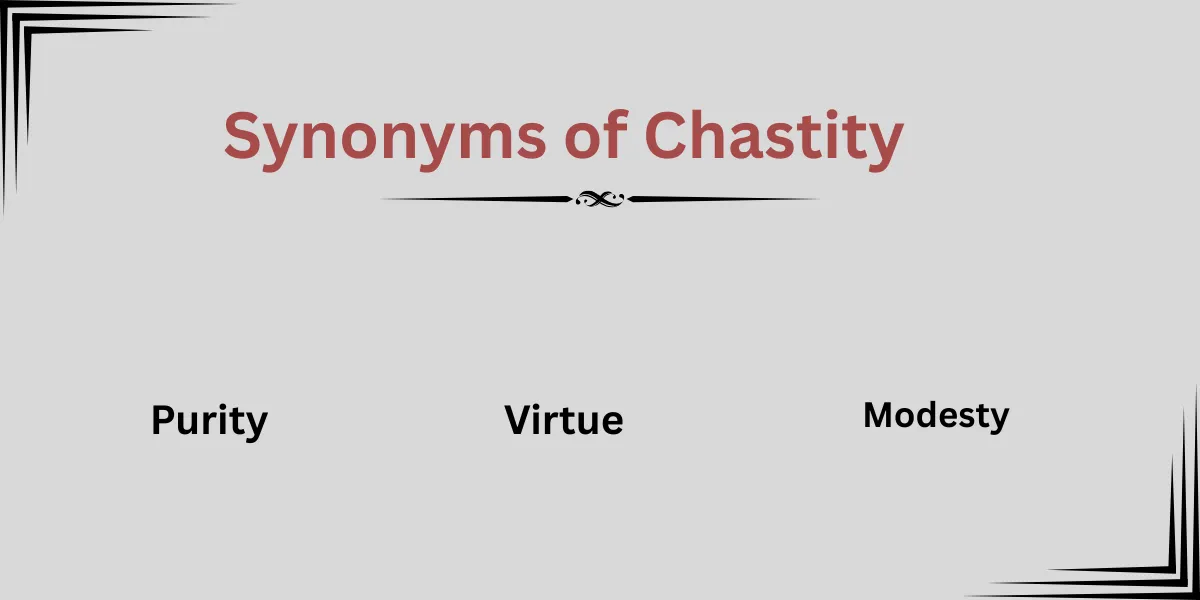Synonyms of chastity, such as purity, celibacy, and modesty, describe self-restraint, especially regarding sexual behavior. For example, celibacy often refers to a conscious choice to abstain from sexual activity, while purity can reflect moral or spiritual cleanliness. These words highlight different ways people express discipline, virtue, and respect for themselves or others.
If you’re writing about values, morality, or personal choices, using a chastity synonym helps convey your message with clarity and sensitivity.
In this guide, you’ll learn the meaning and example sentences for each synonym of chastity, so you can discuss virtue and self-restraint confidently and precisely.
What Does Chastity Mean?
Chastity means refraining from sexual activity or maintaining purity in thoughts and actions. It often reflects personal discipline, moral values, or spiritual commitment.
Depending on how it’s used, chastity can suggest:
- Celibacy — choosing not to engage in sexual activity
- Purity — maintaining moral or spiritual cleanliness
- Modesty — behaving or dressing with restraint
- Self-control — practicing discipline in desires and actions
At its core, chastity is about respect for oneself and others. It is not just about abstaining; it is a conscious practice of discipline, virtue, and thoughtful behavior.
Synonyms of Chastity (With Meanings, Examples & Usage Tips)
1. Purity
Meaning: The state of being clean, innocent, or morally untainted.
Example: Her purity of heart inspired everyone around her.
When to Use: Use “purity” in spiritual or moral contexts, emphasizing wholesomeness and innocence rather than sexual restraint.
2. Virtue
Meaning: Moral excellence or righteousness.
Example: He lived a life guided by virtue and honesty.
When to Use: Ideal for moral or ethical discussions; broader than chastity and includes all forms of moral goodness.
3. Modesty
Meaning: Humble behavior or avoidance of indecency.
Example: Her modesty made her stand out in a world obsessed with showmanship.
When to Use: Best used when describing demeanor or clothing that reflects humility and restraint.
4. Decency
Meaning: Behavior conforming to accepted moral standards.
Example: He was respected for his sense of decency in every situation.
When to Use: Appropriate in social or public settings, emphasizing respectability.
5. Innocence
Meaning: Lack of guilt, corruption, or moral wrong.
Example: The child’s innocence reminded them of simpler times.
When to Use: Ideal for youthful or spiritual contexts, emphasizing freedom from moral corruption.
6. Celibacy
Meaning: The state of abstaining from marriage and sexual relations.
Example: He chose celibacy as part of his religious commitment.
When to Use: Perfect for religious, spiritual, or lifestyle contexts; focuses on abstinence rather than moral purity.
7. Abstinence
Meaning: The act of refraining from indulgence, especially sexual activity or drinking.
Example: She practiced abstinence as a form of self-discipline.
When to Use: Suitable for self-control or health-related discussions rather than moral ones.
8. Temperance
Meaning: Moderation or self-restraint, particularly regarding desires or pleasures.
Example: His temperance in speech and behavior earned admiration.
When to Use: Great in philosophical or lifestyle contexts focusing on balance and discipline.
9. Piety
Meaning: Deep devotion to religious or moral principles.
Example: Her piety was evident in every word and action.
When to Use: Use when describing faith-driven purity or spiritual dedication.
10. Fidelity
Meaning: Faithfulness or loyalty, often in relationships.
Example: Their marriage thrived on mutual fidelity and trust.
When to Use: Appropriate for romantic or marital contexts, focusing on loyalty over abstinence.
11. Integrity
Meaning: Moral soundness and consistency of character.
Example: His integrity never wavered, even under pressure.
When to Use: Broader than chastity; fits discussions of ethical behavior and honesty.
12. Honor
Meaning: Upholding moral and ethical principles with dignity.
Example: She valued honor above wealth or fame.
When to Use: Often used in traditional or heroic contexts, emphasizing moral courage.
13. Morality
Meaning: Principles concerning right and wrong behavior.
Example: Their decisions reflected a strong sense of morality.
When to Use: Use when referring to societal standards rather than personal restraint.
14. Saintliness
Meaning: Holiness and moral purity associated with saints.
Example: Her saintliness inspired others to live more kindly.
When to Use: Ideal in religious or inspirational writing that conveys spiritual purity.
15. Righteousness
Meaning: Acting in accordance with moral or divine law.
Example: He walked the path of righteousness all his life.
When to Use: Perfect for religious, ethical, or justice-oriented contexts.
16. Cleanliness
Meaning: Freedom from moral or physical impurity.
Example: He believed cleanliness of heart mattered more than outward appearance.
When to Use: Works metaphorically for purity of mind or body.
17. Uprightness
Meaning: Honest and morally correct conduct.
Example: Her uprightness earned her the trust of the community.
When to Use: Ideal for describing moral reliability in social or professional settings.
18. Rectitude
Meaning: Strong moral integrity and correctness.
Example: He was known for his rectitude and clear conscience.
When to Use: Use in formal writing to emphasize moral soundness and honor.
19. Sanctity
Meaning: The quality of being sacred or holy.
Example: They respected the sanctity of marriage deeply.
When to Use: Best for religious or spiritual contexts focusing on sacredness.
20. Blamelessness
Meaning: Free from guilt or wrongdoing.
Example: Her blamelessness made false accusations hard to believe.
When to Use: Suitable for defensive or moral purity contexts.
21. Spotlessness
Meaning: Without any stain or moral fault.
Example: The hero’s spotlessness symbolized ideal virtue.
When to Use: Works metaphorically to describe an untainted character.
22. Morality
Meaning: Standards or principles of right conduct.
Example: His morality guided every major decision he made.
When to Use: Broader than chastity, encompassing overall ethics.
23. Self-restraint
Meaning: Control over one’s impulses or desires.
Example: Her self-restraint in the face of temptation was admirable.
When to Use: Use when emphasizing discipline over spiritual or moral purity.
24. Discipline
Meaning: Training oneself to act according to moral or practical rules.
Example: He maintained discipline in every aspect of life.
When to Use: Ideal for personal growth or ethical self-control.
25. Simplicity
Meaning: Absence of vanity or pretension; living with purity of purpose.
Example: Her simplicity reflected her inner peace and virtue.
When to Use: Use in poetic or lifestyle writing to reflect the purity of heart.
26. Demureness
Meaning: Reserved, modest, and shy behavior, especially in women.
Example: Her demureness gave her an air of classic grace.
When to Use: Common in literature or social commentary focusing on modest femininity.
27. Virtuousness
Meaning: Possession of moral excellence and chastity.
Example: Her virtuousness was praised by everyone in the village.
When to Use: Closely tied to chastity; formal and often used in historical or religious writing.
28. Godliness
Meaning: Deep devotion and moral behavior that aligns with divine will.
Example: His godliness was evident in his compassion and humility.
When to Use: Use in spiritual writing, emphasizing holiness or divine obedience.
29. Propriety
Meaning: Conformity to accepted social or moral standards.
Example: She always maintained propriety in her speech and actions.
When to Use: Great for etiquette, decorum, and social behavior discussions.
30. Morally Upright
Meaning: Living according to ethical and honorable principles.
Example: He remained morally upright despite the corruption around him.
When to Use: Everyday phrase emphasizing steady moral strength and purity of conduct.
How to Choose the Right Synonym
Choosing the best synonym for chastity depends on tone, intent, and context:
- Religious or Spiritual Writing: Use piety, sanctity, or godliness to emphasize holiness.
- Romantic or Personal Contexts: Opt for fidelity or modesty to focus on loyalty and respect.
- Philosophical or Ethical Tone: Choose virtue, integrity, rectitude, or righteousness for moral depth.
- Self-Discipline or Lifestyle Discussions: Abstinence, temperance, and self-restraint fit best.
- Poetic or Emotional Expression: Use innocence, purity, or simplicity to evoke beauty and serenity.
Cultural and Emotional Nuances
The concept of chastity carries different connotations across cultures:
- In Western traditions, it is often connected with religious virtue or moral restraint.
- In Eastern philosophies, chastity aligns with spiritual balance and inner discipline.
- In modern contexts, it can symbolize personal boundaries, empowerment, or self-respect rather than restriction.
Understanding these cultural shades ensures sensitivity and precision in writing.
Conclusion: The Art of Using “Chastity”
Using synonyms for “chastity” requires more than vocabulary—it demands emotional awareness and contextual judgment.
Words like purity or innocence add tenderness, while virtue or integrity project strength. By understanding each synonym’s tone and setting, writers can express purity, restraint, or devotion in a way that feels authentic and powerful.
In essence, the best synonym is the one that captures both the purity of intent and the truth of context—whether it’s spiritual, emotional, or moral.




